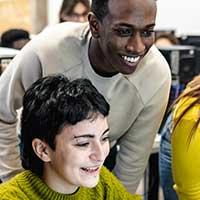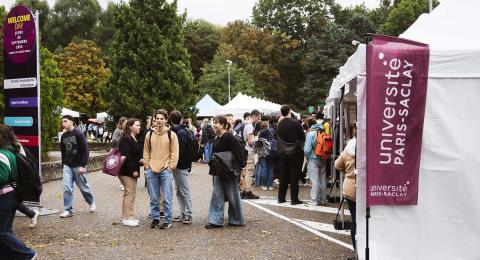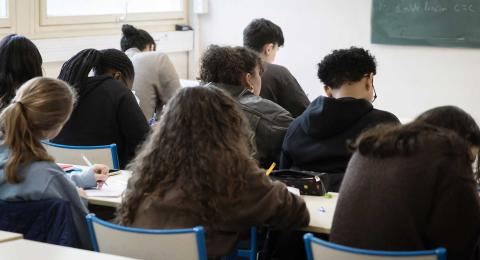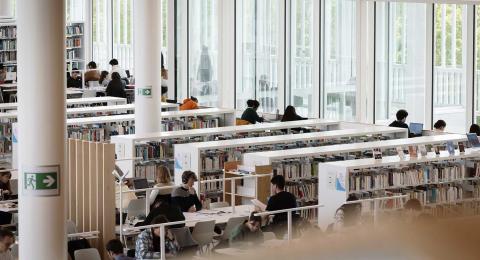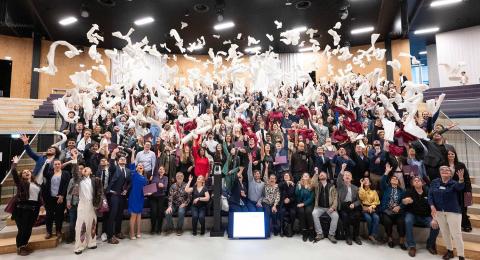The M2 BEB offers an international training in English that addresses the need to develop a global bioeconomy based on the sustainable use of biological resources, in the context of the ecological transition.
The program comprises 5 mandatory courses, 1 elective course to be chosen among 2 courses, and 1 MSc thesis internship. Teamwork and experimental training are 2 pillars of the pedagogy.
Informations
Compétences
- implement up-to-date biotechnological tools to improve the knowledge of plant or microbial metabolisms, and to harness them for the development of novel bioprocesses or bio-based products;
- carry out a research project in a multicultural team;
- develop a global and holistic vision of the bioeconomy.
Objectifs pédagogiques de la formation
The 2 main objectives are:
• to provide in-depth theoretical and practical knowledge of plant biochemical diversity and of the biotechnological tools (genetic modification, synthetic biology, innovative extraction strategies according to green chemistry principles) supporting innovation in the bioeconomy;
• to train students to implement industry-driven approaches for innovation in the bioeconomy.
Débouchés
Professionnels
Après Master + Doctorat : chercheur ou enseignant-chercheur
Après un Master ou Master + Doctorat : ingénieur (recherche-développement, contrôle, production…) dans les domaines santé, pharmacie, agroalimentaire, biotechnologies, instruments et réactifs, cosmétique, dépollution et environnement
Ingenieur R&D
Responsable de projets R&D
Poursuite d’études
Chercheur/chercheuse en R&D ou expert·e en modélisation et analyse de données dans des entreprises ou laboratoires de pointe.
Thèse de doctorat
Tarifs et bourses
Les montants peuvent varier selon les formations et votre situation.
Voie d’accès
Capacité d’accueil
Places
Public visé et prérequis
The admission requirements for the M2 BEB are the following:
• BSc degree or equivalent degree of at least 180 ECTS in Engineering or Science, including a strong background in at least one discipline related to Biology: Biotechnology, Biochemistry, Microbiology, Biophysics, Bioprocess engineering, Molecular biology
• Demonstrated English language proficiency B2 advanced.
The candidates are selected based on their background, academic results, and motivation (alignment between the personal professional project and the M2 BEB program).
Pièces justificatives
Obligatoires
Copie diplômes.
Copie du passeport.
Lettre de motivation.
Tous les relevés de notes des années/semestres validés depuis le BAC à la date de la candidature.
Attestation de niveau d'anglais.
Curriculum Vitae.
Facultatives
Lettre de recommandation ou évaluation de stage.
Dossier VAPP (obligatoire pour toutes les personnes demandant une validation des acquis pour accéder à la formation) https://www.universite-paris-saclay.fr/formation/formation-continue/validation-des-acquis-de-lexperience.
Document justificatif des candidats exilés ayant un statut de réfugié, protection subsidiaire ou protection temporaire en France ou à l’étranger (facultatif mais recommandé, un seul document à fournir) :
- Carte de séjour mention réfugié du pays du premier asile
- OU récépissé mention réfugié du pays du premier asile
- OU document du Haut Commissariat des Nations unies pour les réfugiés reconnaissant le statut de réfugié
- OU récépissé mention réfugié délivré en France
- OU carte de séjour avec mention réfugié délivré en France
- OU document faisant état du statut de bénéficiaire de la protection subsidiaire en France ou à l’étranger.





